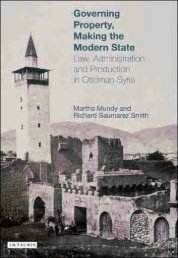The Young Turk Period, 1908-1918 - PSI424
The Young Turk Period, 1908-1918 - PSI424
The Young Turk Period, 1908-1918 - PSI424
Create successful ePaper yourself
Turn your PDF publications into a flip-book with our unique Google optimized e-Paper software.
304 <strong>The</strong> Rise of Modern <strong>Turk</strong>ey, 1808-1975<br />
could be used to retain the connections with the Muslim brothers in the Arab world,<br />
Central Asia, and the Far East, but the interests of the <strong>Turk</strong>ish nation had to<br />
be uppermost. Islam had to be <strong>Turk</strong>ified. Arab traditions had to be replaced by<br />
<strong>Turk</strong>ish traditions, rituals and prayers had to be carried out in the <strong>Turk</strong>ish language<br />
and in the <strong>Turk</strong>ish way, and the Koran had to be taught in <strong>Turk</strong>ish, so that<br />
the people would understand their religion and appreciate God far more than they<br />
could when reciting phrases in a foreign tongue. 101<br />
<strong>The</strong> Islamicists and Pan-Islam<br />
Though the CUP emphasized <strong>Turk</strong>ish nationalism, the strong Islamicist feelings<br />
nurtured during Abdulhamit's reign were not forgotten. <strong>The</strong> fact that the <strong>Turk</strong>s<br />
now shared the empire primarily with Arab Muslim brothers even strengthened the<br />
feelings of many that for survival they should emphasize Islam rather than Ottomanism<br />
or <strong>Turk</strong>ism. This group, however, lacked effective leadership. <strong>The</strong> major<br />
Islamicist group, the Society for Islamic Unity, had come to a sudden end following<br />
the failure of the counterrevolution in the spring of 1909. Its basic message had<br />
been that Islam had to be maintained as the religion of the state; no matter how the<br />
regime was established and whether it was autocratic or constitutional, its primary<br />
duty was to enforce the Muslim religious law; and because the <strong>Young</strong> <strong>Turk</strong>s were<br />
not following the §eriat, they were secularists and atheists and had to be overthrown.<br />
Though the party ceased to exist, its philosophy was kept alive by Sait<br />
Nursi (1867-1960), who led a group of religious reactionaries called "Followers of<br />
Light" (Nurcu) and favored the reestablishment of religious autocracy until the<br />
day of his death, well into the republican period. 102<br />
Another influential Islamicist group was the Society of Islamic Learning<br />
(Cemiyet-i Ilmiye-i Islamiye), which, starting in <strong>1908</strong>, published its ideas in its<br />
monthly periodical, Bey an ul-Hak (Presentation of the Truth). It was led by<br />
Mustafa Sabri, who achieved his greatest notoriety during the Allied occupation of<br />
Istanbul following World War I (<strong>1918</strong>-1923), when he led a number of ulema who<br />
cooperated with the British in abolishing the secular measures introduced by the<br />
<strong>Young</strong> <strong>Turk</strong>s. Sabri led those who felt that Islam could in fact itself become the<br />
principal vehicle for the empire's modernization; Muslims had to unite to reform<br />
their religion on its own terms as well as to repel the attacks by non-Muslims. 103<br />
<strong>The</strong> most intellectual Islamicist group was that led by the poet Mehmet Akif<br />
(1870-1936) and a group of conservative intellectuals who published their ideas in<br />
the monthly Sirat-i Miistakhn (<strong>The</strong> Straight Path), later called Sebil ur-Resad<br />
(Fountain of Orthodoxy). Claiming that Abdulhamit's autocracy had violated the<br />
simple faith of the Prophet and the Orthodox Caliphs as much as had the secular<br />
<strong>Young</strong> <strong>Turk</strong>s, Akif and his followers emphasized the perfect conformity of the<br />
Constitution with the democracy of Islam, with the Parliament representing the<br />
earliest Muslim practices of consultation among believers. But they differed with<br />
the reformers over those policies that attempted to introduce Western institutions<br />
and to give equality to non-Muslims. Those policies that emphasized union with the<br />
<strong>Turk</strong>s of the world at the expense of universal Muslim ties also were condemned.<br />
Western civilization had corrupted the Islamic ethic, and Muslims would have to<br />
return to their old values and unity if they were to be rescued from imperialism.<br />
Islam could take only the science and technology of the West, rejecting the elements<br />
of government that would weaken the Islamic community. <strong>The</strong>re was a tremendous<br />
gap between the so-called educated people and the mass of the people. <strong>The</strong> former












